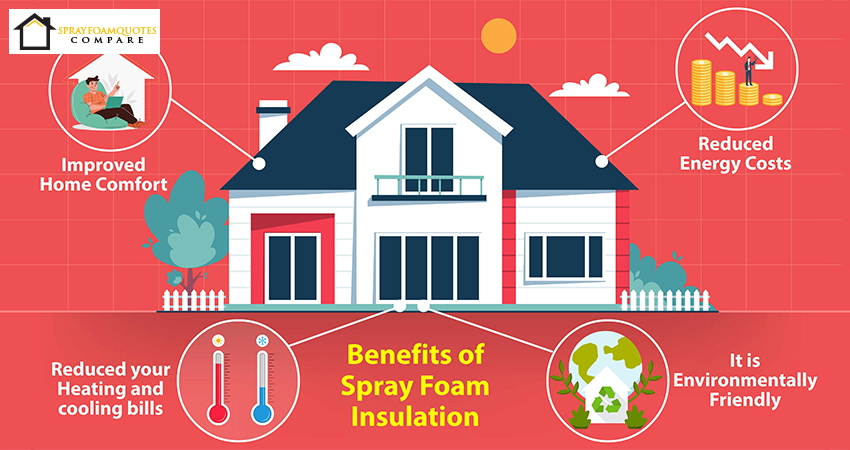The Benefits of Spray Foam Insulation
Spray foam insulation is a highly effective and versatile insulation material that offers numerous benefits for homeowners and businesses alike. In this article, we will explore the advantages of using spray foam insulation and how it can help improve energy efficiency, reduce utility costs, and create a more comfortable living or working environment.
Enhanced Energy Efficiency
Spray foam insulation is renowned for its exceptional ability to create an airtight seal. Unlike traditional insulation materials, such as fiberglass or cellulose, spray foam expands and fills all cracks, gaps, and voids in the building envelope. This airtight seal prevents air leakage, which is a major source of energy loss in buildings.
By eliminating air leaks, spray foam insulation significantly reduces the amount of energy required to heat or cool a space. This leads to lower energy consumption and can result in substantial savings on utility bills. Additionally, improved energy efficiency helps to reduce greenhouse gas emissions, contributing to a more sustainable environment.
Superior Insulation Performance
One of the key advantages of spray foam insulation is its superior insulation performance. The material has a high R-value, which is a measure of its thermal resistance. Spray foam insulation provides better insulation per inch compared to other types of insulation, allowing for thinner walls and increased usable space.
Furthermore, spray foam insulation is resistant to moisture and does not retain water. This prevents the growth of mold and mildew, which can cause health issues and damage to the structure of a building. The moisture resistance of spray foam insulation also helps to prolong the lifespan of the building materials it is applied to.
Improved Indoor Comfort
Due to its ability to create an airtight seal, spray foam insulation helps to maintain a consistent indoor temperature throughout the year. It eliminates drafts and cold spots, ensuring a comfortable living or working environment regardless of the weather conditions outside.
In addition to temperature control, spray foam insulation also provides excellent sound insulation. It reduces the transmission of airborne noises, making interiors quieter and more peaceful. This is particularly beneficial for homes and offices located in noisy areas or near busy roads.
Environmental Friendliness
Spray foam insulation is considered an environmentally friendly choice for insulation. It helps to reduce energy consumption, as mentioned earlier and contributes to a smaller carbon footprint. The material itself is non-toxic and does not release harmful gases into the air.
Furthermore, spray foam insulation can help improve indoor air quality by reducing the infiltration of pollutants, allergens, and outdoor contaminants into the building. This is particularly beneficial for individuals with respiratory conditions or allergies.

Spray foam insulation offers a wide range of benefits, including enhanced energy efficiency, superior insulation performance, improved indoor comfort, and environmental friendliness. By choosing spray foam insulation, homeowners and businesses can enjoy lower energy bills, increased comfort, and a healthier living or working environment. Consider the advantages of spray foam insulation when looking to improve the insulation of your property.
Frequently Asked Questions about the Benefits of Spray Foam Insulation
1. What is spray foam insulation?
Spray foam insulation is a type of insulation material that is sprayed onto surfaces to create an airtight seal, providing thermal insulation and reducing energy loss.
2. What are the benefits of using spray foam insulation?
Spray foam insulation offers several benefits, including:
Improved energy efficiency
Reduced utility bills
Enhanced indoor comfort
Noise reduction
Increased structural strength
Prevention of air and moisture infiltration
Long lifespan
Environmentally friendly
3. How does spray foam insulation improve energy efficiency?
Spray foam insulation creates a seamless and airtight barrier that helps to prevent air leakage and heat transfer, resulting in reduced energy consumption and lower heating/cooling bills.
4. Can spray foam insulation help with noise reduction?
Yes, spray foam insulation can help to reduce noise transmission by sealing gaps and cracks that allow sound to travel. It acts as a sound barrier, making your indoor environment quieter.
5. Does spray foam insulation have any health benefits?
Spray foam insulation can contribute to a healthier indoor environment by reducing the infiltration of allergens, pollutants, and moisture, which can lead to improved air quality and a decrease in respiratory issues.
6. Is spray foam insulation suitable for all types of buildings?
Spray foam insulation is versatile and can be used in various types of buildings, including residential homes, commercial buildings, and industrial facilities.
7. How long does spray foam insulation last?
Spray foam insulation has a long lifespan, typically lasting for several decades without losing its effectiveness. It is a durable insulation option.
8. Is spray foam insulation environmentally friendly?
Yes, spray foam insulation is considered environmentally friendly because it helps to reduce energy consumption, leading to lower greenhouse gas emissions. It also minimizes the need for additional insulation materials.
9. Can spray foam insulation improve the structural strength of a building?
Yes, spray foam insulation can enhance the structural strength of a building by adding rigidity and stability to the walls and roof. It can also help to prevent moisture-related issues that can weaken the structure over time.
10. How can I determine if spray foam insulation is suitable for my property?
To determine if spray foam insulation is suitable for your property, it is recommended to consult with a professional insulation contractor who can assess your specific needs and provide expert advice.




